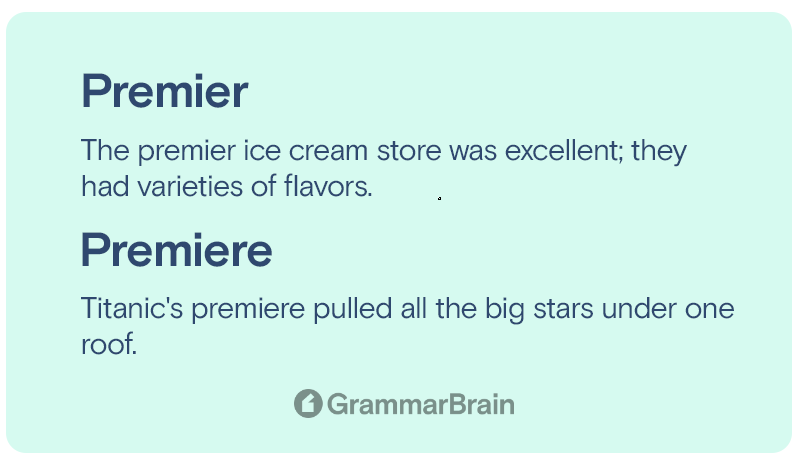Is it premier or premiere? Have you ever used the incorrect word or got confused because of the similarity of the two words? We are here to save you from such embarrassing moments. Premier and premiere are such two words that many people use interchanging without knowing the difference.
Learn the key differences in this short American English guide…
Premier vs. Premiere: The Difference
- Premier
Premier is usually used as both adjective and a noun. It has different meanings. As a noun, the word means the head of a country or state. In many countries, they use the term premier for their prime ministers. Premier can also substitute words like king, president, or chief position.
Another meaning of premier is top-notch, outstanding, first-class quality, or first in rank. When used as an adjective this word means most prominent or distinguished. It also means first in time or earlier.
- Premiere
Premiere with an “E” at the end means a first-time presentation or public performance of a movie, play, or TV show. It’s a noun and a well-known word for movie lovers.

Sentence Examples of Premier
- Jane Austen was the premier author of her generation, and she continues to teach us lessons through her writings.
- The premier ice cream store was excellent; they had varieties of flavors.
- Barack Obama is the first African American premier of the United States.
Sentence Examples of Premiere
- Walking the red carpet at a movie premiere was Maria’s dream.
- Titanic’s premiere pulled all the big stars under one roof.
- My friend went to the premiere of the new star war movie because he is a huge fan.
Origin of the Words Premier and Premiere
Premier and premiere are related and have similar meanings due to their origin. Both these words come from the French adjective premier. It means the first quality or first in a row or sequence. Premiere wasn’t an English word till the late 19th century.
However, the premier word was found before the 15th century. Some experts also believe that the word premier originated from the Latin word primarious. It means principal.
Understanding the origins of the terms helps trace their original meanings, and you might learn the roots, and it may become easier for you to remember the words and use them correctly.
Can Premiere be Used as a Verb?
People used premiere as a verb in the late 1920s. However, that way of using this word was controversial and met with criticism from language experts. Yet, it is widely used as a verb but not in the entertainment context. It can mean – for the first time ever. Here is an example:
- The seventh grade premiered a new sport game, and everyone at school loved it.
- They premiered a new degree course in our college.
Simple Trick to Remember the Difference Between Premier and Premiere
As you already know, premiere means the first presentation of a performance. The word is commonly used for movie premieres. The word movie ends with an e, and the premiere has an extra e at the end. This way, you can remember the difference between premier and premiere. Easy, isn’t it?
Conclusion
We hope that the similarity of premier vs premiere may not confuse you anymore. It’s simple if you understand the roots and meanings. Happy learning!
Inside this article
Fact checked:
Content is rigorously reviewed by a team of qualified and experienced fact checkers. Fact checkers review articles for factual accuracy, relevance, and timeliness. Learn more.
Core lessons
Glossary
- Abstract Noun
- Accusative Case
- Anecdote
- Antonym
- Active Sentence
- Adverb
- Adjective
- Allegory
- Alliteration
- Adjective Clause
- Adjective Phrase
- Ampersand
- Anastrophe
- Adverbial Clause
- Appositive Phrase
- Clause
- Compound Adjective
- Complex Sentence
- Compound Words
- Compound Predicate
- Common Noun
- Comparative Adjective
- Comparative and Superlative
- Compound Noun
- Compound Subject
- Compound Sentence
- Copular Verb
- Collective Noun
- Colloquialism
- Conciseness
- Consonance
- Conditional
- Concrete Noun
- Conjunction
- Conjugation
- Conditional Sentence
- Comma Splice
- Correlative Conjunction
- Coordinating Conjunction
- Coordinate Adjective
- Cumulative Adjective
- Dative Case
- Determiner
- Declarative Sentence
- Declarative Statement
- Direct Object Pronoun
- Direct Object
- Diction
- Diphthong
- Dangling Modifier
- Demonstrative Pronoun
- Demonstrative Adjective
- Direct Characterization
- Definite Article
- Doublespeak
- False Dilemma Fallacy
- Future Perfect Progressive
- Future Simple
- Future Perfect Continuous
- Future Perfect
- First Conditional
- Irregular Adjective
- Irregular Verb
- Imperative Sentence
- Indefinite Article
- Intransitive Verb
- Introductory Phrase
- Indefinite Pronoun
- Indirect Characterization
- Interrogative Sentence
- Intensive Pronoun
- Inanimate Object
- Indefinite Tense
- Infinitive Phrase
- Interjection
- Intensifier
- Infinitive
- Indicative Mood
- Participle
- Parallelism
- Prepositional Phrase
- Past Simple Tense
- Past Continuous Tense
- Past Perfect Tense
- Past Progressive Tense
- Present Simple Tense
- Present Perfect Tense
- Personal Pronoun
- Personification
- Persuasive Writing
- Parallel Structure
- Phrasal Verb
- Predicate Adjective
- Predicate Nominative
- Phonetic Language
- Plural Noun
- Punctuation
- Punctuation Marks
- Preposition
- Preposition of Place
- Parts of Speech
- Possessive Adjective
- Possessive Determiner
- Possessive Case
- Possessive Noun
- Proper Adjective
- Proper Noun
- Present Participle
- Prefix
- Predicate



